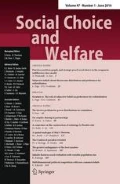Abstract
Libertarian Paternalism (LP) purports to be a kind of paternalism that is “liberty-preserving” and hence compatible with liberal principles. In this paper, I argue against this compatibility claim. I show that LP violates core liberal principles, first because it limits freedom, and secondly because it fails to justify these limitations in ways acceptable to liberal positions. In particular, Libertarian Paternalists argue that sometimes it is legitimate to limit people’s liberties if it improves their welfare. A closer look at the welfare notions used, however, reveals that they respect neither the subjectivity nor the plurality of people’s values. Thus its justification of the liberty-welfare trade-off is not compatible with liberal principles. I conclude that to justify LP policies, one must appeal to traditional paternalistic principles—and thus, there is no categorical difference between “libertarian” and other forms of paternalism.
Similar content being viewed by others
References
Berlin I (1969) Two Concepts of Liberty. In four essays on liberty. Oxford, Oxford University Press, pp 118–72
Bovens L (2009) The ethics of nudge. In: Gruene-Yanoff T, Hansson SOModelling preference change: perspectives from economics, psychology and philosophy. Springer, Heidelberg, pp 207–219
Broome J (1991) Weighing goods—equality, uncertainty and time. Basil Blackwell, Cambridge
Camerer C, Issacharoff S, Loewenstein G, O’Donoghue T, Rabin M (2003) Regulation for conservatives: behavioral economics and the case for asymmetric paternalism. Univ Pa Law Rev 1151(3): 1211–1254
Dworkin G (2005) Paternalism. In: Edward NZ (ed) The stanford encyclopedia of philosophy (Winter 2005 Edition). http://plato.stanford.edu/archives/win2005/entries/paternalism/.
Gaus GF (1996) Justificatory liberalism: an essay on epistemology and political theory. Oxford University Press, Oxford
Locke J (1975) An essay concerning human understanding. In: Peter H (ed) Nidditch. Oxford, Clarendon Press. First published 1706.
Loewenstein G, Haisley E (2008) The economist as therapist: methodological issues raised by “light” paternalism. In: Caplin A, Schotter A (eds) The Foundations of positive and normative economics: a handbook. Oxford University Press, Oxford, pp 210–247
Pettit P (1996) Freedom as antipower. Ethics 106: 576–604
Rawls J (1971) A theory of justice. Oxford University Press, Oxford
Rosati C (1996) Internalism and the good for a person. Ethics 106(1996): 297–326
Sunstein CR (2007) Libertarian Paternalism. University of Chicago Law School Faculty Blog. http://uchicagolaw.typepad.com/faculty/2007/01/libertarian_pat.html
Sunstein CR, Thaler RH (2003) Libertarian paternalism is not an oxymoron. Univ Chic Law Rev 70(4): 1159–1202
Thaler RH, Sunstein CR (2003) Libertarian paternalism. Am Econ Rev 93(2): 175–179
Thaler RH, Sunstein CR (2008) Nudge. Improving decisions about health, wealth and happiness. Yale University Press, New Haven
Author information
Authors and Affiliations
Corresponding author
Rights and permissions
About this article
Cite this article
Grüne-Yanoff, T. Old wine in new casks: libertarian paternalism still violates liberal principles. Soc Choice Welf 38, 635–645 (2012). https://doi.org/10.1007/s00355-011-0636-0
Received:
Accepted:
Published:
Issue Date:
DOI: https://doi.org/10.1007/s00355-011-0636-0




